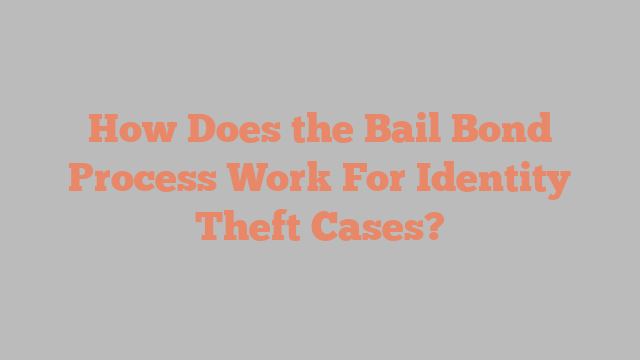Bail Bond Process Work For Identity Theft Cases
Identity theft and aggravated identity fraud are serious crimes that can have far-reaching consequences for individuals charged with them. If you or someone you know is facing these charges, it is important to understand the legal implications and how bail works for such cases. 911 bail bonds can help explain the process and answer any questions you might have about securing bail in the state of Connecticut.
The process for securing bail after being charged with a crime starts when the person is arrested and taken to jail to await their first court appearance or bail hearing. During this hearing, the judge will review the criminal charge and set an appropriate bail amount. In addition to the severity of the crime, the judge will consider the defendant’s past history and whether they pose a flight risk.

Some jurisdictions have a standard bail schedule for specific crimes, but judges can deviate from these guidelines in their discretion. During the bail hearing, the judge will also consider the person’s ability to pay their bond amount if they fail to show up for court. The judge may require a deposit or collateral such as a car or house to ensure the defendant will appear in all court proceedings.
How Does the Bail Bond Process Work For Identity Theft Cases?
If you or a loved one is charged with identity theft and are unable to afford the full amount of their bond, you can work with a bail bondsman to secure your release from jail. A bail bondsman will require a non-refundable fee, typically 10% of the total bond amount, and will provide the court with a guarantee that the defendant will attend all scheduled court appearances.
Defendants can also pledge property such as real estate, jewelry, or stock to cover their bond amounts. When this occurs, the bondsman will place a lien on that property to make sure that the defendant will attend all future court appearances. If the defendant skips bail and goes on the run, the property will be confiscated by the court and a warrant will be issued for their arrest.
Personal recognizance allows individuals to be released without posting any financial collateral, relying on their commitment to appear in court. Unsecured bonds similarly do not require upfront payment but may involve financial consequences if the defendant fails to appear.
In rare cases, the judge will allow the defendant to go on their own recognizance, which means they will be released from jail without any deposit or collateral if they promise to abide by all restrictions set by the court and to attend all of their trial dates. A good defense attorney can often have this option available for their client, which can save them thousands of dollars in bail fees. If you are interested in learning more about the bail bond process for identity theft and aggravated identity fraud, contact 911 Bail Bonds today. Our bail agents are available twenty-four hours a day to assist you with your bail needs. We offer free consultations to all of our clients. Contact us online to request yours today!
